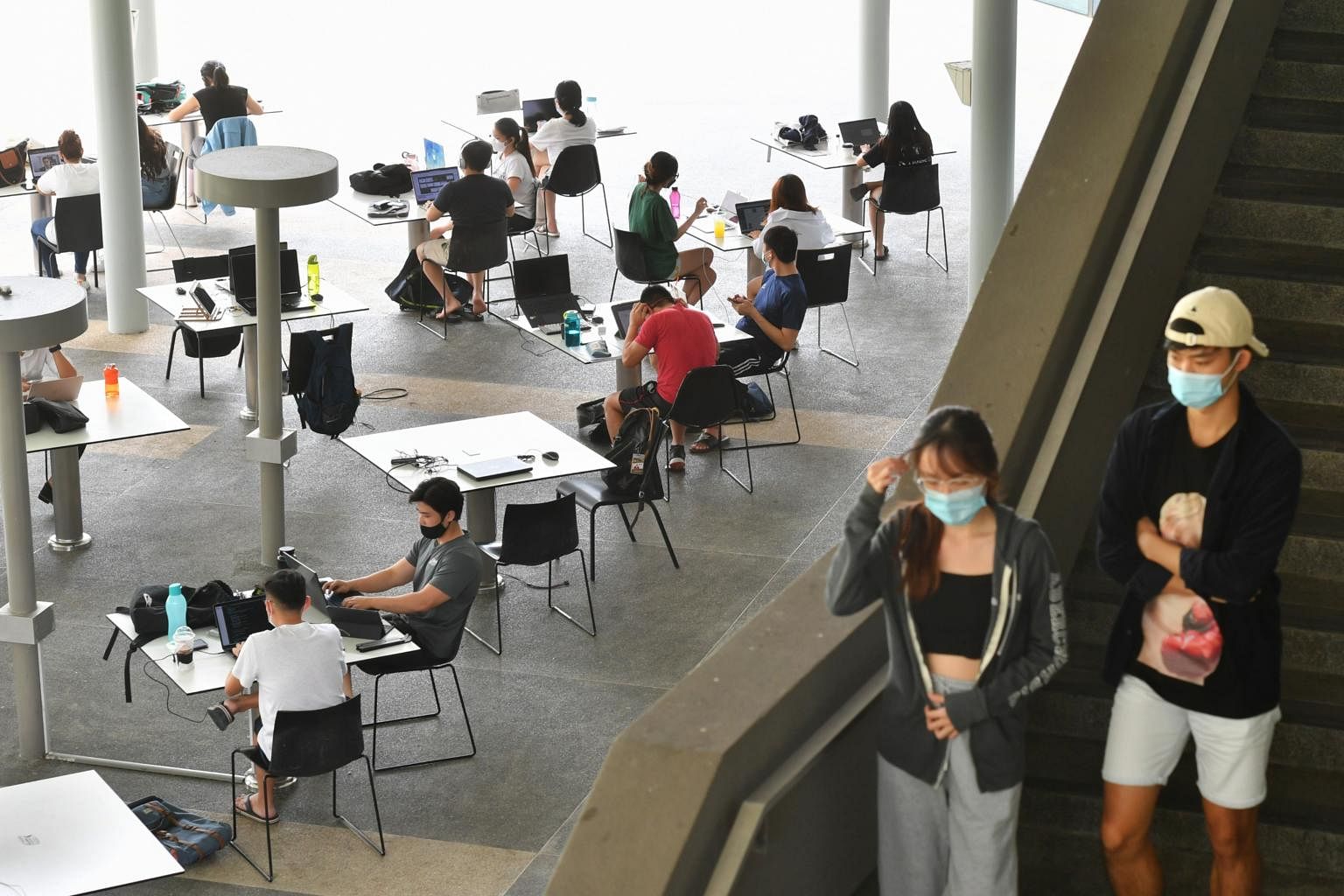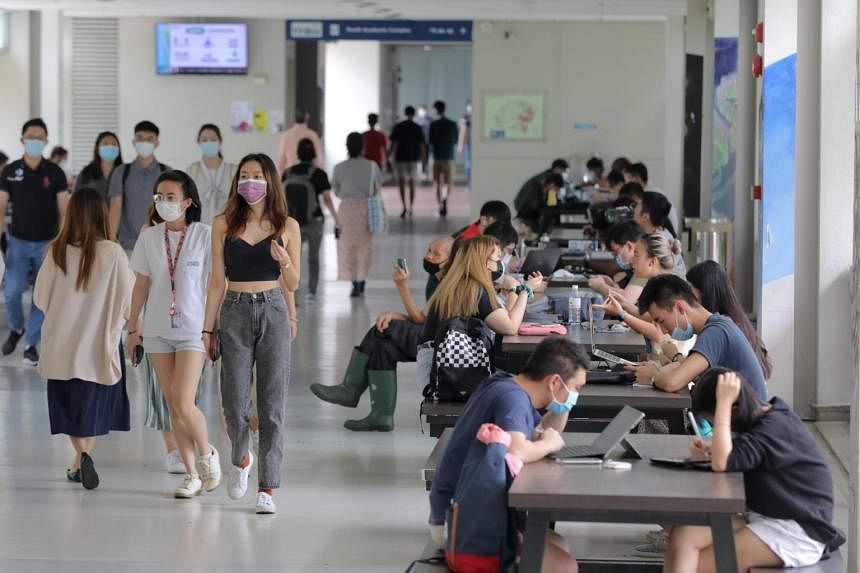SINGAPORE - "Grace days", tackling a "grades-obsessed culture", and improving the quality and quantity of university mental health services were among recommendations to improve the mental health of undergraduates, in a report by the Inter-University Network (IUN).
The IUN is a network of youth representatives from five student unions in Singapore: National University of Singapore (NUS), Nanyang Technological University (NTU), Singapore Management University (SMU), Singapore Universiy of Technology and Design (SUTD) and Yale-NUS College, in partnership with the Singapore Institute of Technology (SIT).
Based on the findings from an online survey of 470 undergraduates from April to May, the UCare Mental Health Report was presented to Minister for Culture, Community and Youth and Second Minister for Law Edwin Tong at the UCare Mental Health Forum on Tuesday (June 21).
Speaking to The Straits Times at the sidelines of the event, Ms Shyanne Loh, 28, student leader at SIT – which collaborated with IUN on the report – noted that the emphasis in Singapore for the past few years has been on raising awareness, and said she hopes the report will result in more concrete action being taken to address mental health issues.
The students surveyed were from NUS, Yale-NUS College, NTU, SIT, SMU and SUTD.
Respondents were asked how stressed they had felt in the three months before the survey on a scale of zero to 10, with 10 being the most stressed. The average level of stress came to 7.6.
Eighty-nine per cent of the respondents said work and study commitments were among their top five sources of stress, while 68 per cent said it was self-confidence. Sixty-four per cent cited career prospects after university, and the same proportion said it was personal relationships.
Referring to the gap in percentage points between those who chose work and study commitments, and the next most commonly selected stressor, self-confidence, the IUN said in its report: "(This) is suggestive of the huge importance undergraduates have placed upon themselves to maintain their studies, either due to expectations placed upon themselves by others or the myriad of other factors that may indicate the importance of studies."
One recommendation by the IUN was the introduction of "grace days", which are allowable delays beyond a specified deadline that can be applied to all assignments, and do not need prior approval for usage.
Noting that several universities around the world, including Harvard University, have adopted this practice, the IUN said it would give students a flexible way to handle their academic issues without the barrier of having to approach another individual, such as their lecturers.
The IUN added that students feel there is a "deep-seated and unhealthy obsession with their grades", as employers continue to use these as the primary part of screening for a hiring process.
This in turn leads to an increase in stress during undergraduates' education, with students primarily focusing on chasing grades and outdoing their peers rather than enjoying learning, said the IUN, calling for a review of universities' curricula, grading systems and mental health resources.
More than half the respondents - about 280 - said they had not used any of the mental health resources provided by their university's administration. Of this group, 28 per cent said this was because they were afraid of being judged by those around them, while 19 per cent said they had heard unsatisfactory remarks about the services from other students.

Highlighting that it takes courage for students to overcome their fear of judgment and seek proper help, the IUN said it was crucial to improve the quality of the current resources available to the undergraduate population, so students feel supported.
It also noted that 15 per cent of those who did not use any university-provided services said this was because of the inefficiency of such services.
"Such patterns suggest the need for universities and government bodies to look into ways to provide more support to ease the manpower bottleneck that university mental health services face," said the IUN.
Asked about the issue of university-initiated mental health resources being overwhelmed, Ms Rebecca Tay, 22, director of wellness in the student government of Yale-NUS College, who is part of the IUN, said it is important for university administrations to understand the stressors that students face and put forth initiatives to tackle them.
She said: “I think rather than counsellors being the single solution to every single mental health emergency students face, more stakeholders can come into this conversation and contribute their efforts as well. That’s why we’re calling on the school administration and faculty to come together to consider how they can support students.”
Nearly 400 of the respondents said they had not made use of any student-led mental health initiatives. Forty-six per cent of this group said this was because they were too busy to attend such sessions, while 26 per cent said they did not know how to start or where to get help.
The report suggested that more effort be placed into publicising and planning student-led initiatives.
"Overall, such a higher usage of student-led initiatives may then reduce the strain placed upon students' oversubscribing to an over-encumbered university counselling service by offering alternative, complementary avenues of support," it said.
Speaking at the event, Mr Tong said data from the National Youth Council's (NYC) Monthly Youth Sentiments Tracker, from February to October last year, found that one in five youth reported poor or very poor mental well-being.
"Action at every level is needed. There's not just a single silver bullet that can solve this problem," he said, highlighting a number of initiatives by the Government and in the community, including the ongoing public consultation on the Interagency Taskforce on Mental Health and Well-being's recommendations, as well as ground-up projects like the NYC's Youth Action Challenge.
Adding that individuals have a part to play too, Mr Tong said: "We must continue strengthening the heart of our community and continue to build a culture of care and a culture of inclusivity that goes beyond a slogan."
Calling on people to play the role of mental health first responders, he added: "Continue to share views and have conversations, so that we can normalise the discussions around mental health... don't be afraid to seek help when you need help. It is not a sign of weakness, it is not a sign of failure."
Ms Tay and Ms Loh both said that rather than a sign that today’s youth are weak, the IUN’s calls for a review of the academic system are an effort of the younger generation to address the challenges they face with better tools and perspectives.
Ms Tay said: “All these are how we can work towards a different reality, where youth are still achieving their goals – but now they’re given the right resources to help them go even further into the future.”
Ms Loh added: “We should look at the values our current youth have, what is important to them, and what makes them resilient in the increasingly competitive world we’re facing.”
8 ways to improve undergraduates' mental health
These are eight of the recommendations made by the Inter-University Network in its mental health report:
1. Review universities' academic infrastructure to prioritise mental health before grades.
2. Offer flexibility in the workload and curriculum, including introducing "grace days".
3. Increase communication between students and the school's administration to shape a better learning environment.
4. Put more effort into publicising and planning student-led mental health initiatives.
5. Ensure peer supporters are rigorously trained and certified.
6. Gather feedback on university-provided counselling services and try to improve by implementing changes.
7. Manage students' expectations of mental health resources on campus.
8. Normalise help-seeking behaviour among students.


